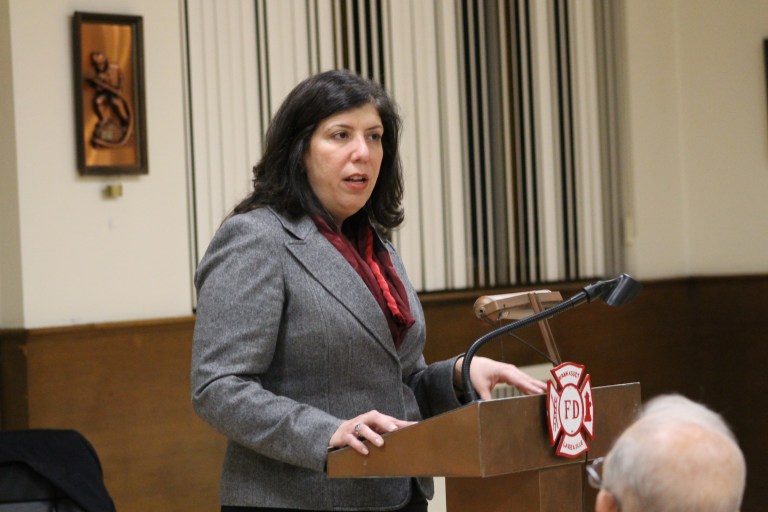
Madeline Singas stopped at a civic group in her hometown of Manhasset Thursday night to speak to members about her job as Nassau County district attorney and what problems face Manhasset.
Originally from Astoria, Singas, who was elected to a four-year term in November 2015, started her career 26 years ago as a Queens County prosecutor after graduating from Fordham University School of Law in 1991.
“Fordham taught me a lot about service and what that means, and you use your degree to do well, or you can use your degree to do good for your community,” Singas said at a Bayview Civic Association meeting. “That meant a lot to me, and I wanted to give back to my community.”
Singas said her parents, who were Greek immigrants, knew little English but understood that education was the key to a successful career, joking that the one word her parents mastered was “study.”
When Kathleen Rice, now a member of Congress, was elected as Nassau County district attorney in 2001, she brought Singas on board to develop a special victims bureau for the county, covering crimes related to physical or sexual abuse of women and children.
“For me, those were very important cases because in my house, even though we didn’t have much, I always felt that I had a very safe home. When I got home, everything was OK. People were encouraging me and protecting me and making sure that nothing bad would happen to me,” Singas said. “When I became a prosecutor, I saw that didn’t happen in every household and some of the people who are supposed to protect you are the people who end up hurting you.”
Singas was promoted to chief assistant, the second in command for the district attorney’s office. When Rice ran for Congress and won in 2014, Singas was promoted to acting district attorney before winning election to the office in 2015.
Singas’ office is composed of 215 assistant district attorneys and about 200 support staffers serving an area of about 1.4 million people with a $34 million budget.
In her time as district attorney, Singas has created four new units: special operations, a mental health unit, an immigrant fraud unit and an elder care unit.
Singas said she learned a lot of people the county was prosecuting had mental health issues, but the system was not prepared to help with mental health. The unit was created to talk to doctors, psychiatrists, police officers and the community about people with mental illnesses to provide the proper care.
Singas said the opioid epidemic on Long Island is both a health crisis and criminal justice crisis, and her office focuses on a three-pronged approach: enforcement, treatment and education.
When asked by Council of Greater Manhasset Civics Association President Richard Bentley what the top issues facing Manhasset are, Singas focused on drinking and corruption.
Singas, who has 15-year-old twins, said she often talks to parents from the area about teenage drinking and what it can lead to in college and beyond.
“I’ve never met a heroin addict who didn’t begin with marijuana and alcohol,” Singas said. “For some people, that’s the gateway, and I tell parents when their kids are getting drunk every weekend, that same six-pack isn’t going to do it later on, so they graduate to harder liquor and pills, pot, heroin, you name it.
“The slide from prescription drugs to heroin you think is an incredibly deep slope, but it’s not. When an addict needs, they’ll do whatever it takes. I once talked to a heroin addict who said ‘If I had to put a needle in my eye to get high, I would.'”
To help combat the opioid crisis, Singas put approximately $700,000 of criminal forfeiture money into treatment to “close the gap.”
Someone who overdoses is typically taken to the emergency room and revived with naloxone, commonly known as Narcan, but is sent home once stable with phone numbers for treatment facilities to call the next day.
Now, Singas said addicts can go to Maryhaven Center of Hope Inc. in Freeport for two nights to six weeks until a bed is available in a treatment center. Singas said more than 200 people have gone through that program.
“These people are in crisis today. That family is in crisis right now, and there was no one there to help them. Tomorrow when they call, treatment centers will say, ‘We don’t have a bed, you have to wait six weeks.’ That person can’t wait six weeks.”
Singas said she has also assisted in orchestrating five major takedowns of drug traffickers in the county, going after dozens of people from low-level street dealers to the top of the chain.
Prosecutors also visit schools regularly to teach children about the dangers of drugs as well as educate parents on what to look for in their children.
Singas said corruption is a prevalent problem throughout the county and the crowd applauded as she discussed her determination to root out elected officials abusing their powers.
“That’s something that really bothers me, when our elected officials who swore an oath to make sure they’re serving the public end up lining their pockets — and we’re all paying for it,” Singas said.






